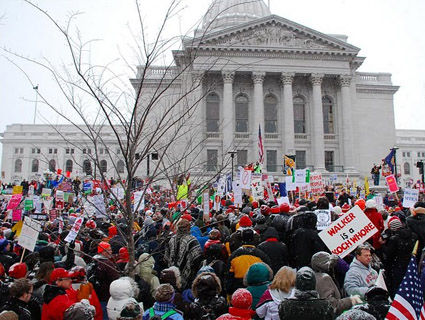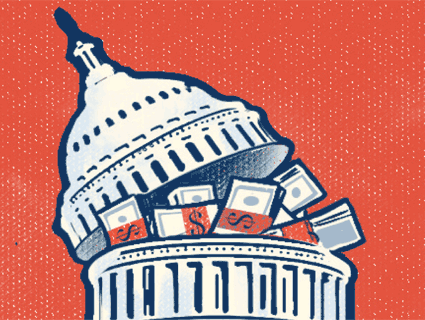Kevin Drum’s March/April cover story on the decline of labor unions as a political force in the United States and the corresponding rise of income inequality is a must-read as Republican governors across the country work to strip workers of collective bargaining rights. Kevin’s conclusion—that if we don’t want inequality and corporate/Wall Street rapacity to get out of hand, we have to find something to replace unions as a mass political force advocating for the interests of the middle class—was widely debated in the blogosphere. Kevin seemed to imply that the death of unions will mean the decline of the Democratic party, which relies on labor as a major source of campaign funds. But Matt Yglesias had another theory:
I think people should shy away from overestimating the partisan stakes here. It’s true that in the very short term extirpating public sector unions will damage the finances of the Democratic Party. But the political system has a strong tendency toward equilibrium. Democrats will keep getting enough money to stay in business and will keep winning approximately half the elections. It’s just that in post-union America, rich businessmen will be the only viable sources of political funding.
My friend (and former Mother Jones employee) Mike Beckel at the Center for Responsive Politics seems to have proven Yglesias’ point. Mike crunched the data, and it turns out that as Democrats have become less dependent on unions, they’ve become ever-more-dependent on rich businessmen and corporations:
A decade ago, corporate PACs favored Republicans over Democrats by about a two-to-one ratio.
By the 2008 election cycle, however, when Democrats were poised to control both chambers of Congress and the White House, contributions from business PACs were split about evenly between Republican and Democratic candidates and groups. During the 2010 election cycle, that parity continued—almost down to the last dollar….
…All the while, labor union PAC contributions hovered between $59 million and $73 million, typically with 90 percent or more of those dollars supporting Democrats each election cycle, according to the Center’s research.
While corporate PACs doled out 73 percent more money during the 2010 election cycle than they did during the 2000 election cycle, union PACs donated just 17 percent more.
Mike has charts, too. It’s pretty clear, as Yglesias theorized, that as union donations fail to keep up with ever-increasing amounts of money from corporations and rich businessmen, the Democrats are forced to replace the union money with corporate dollars. And you can bet that money comes with strings attached.








